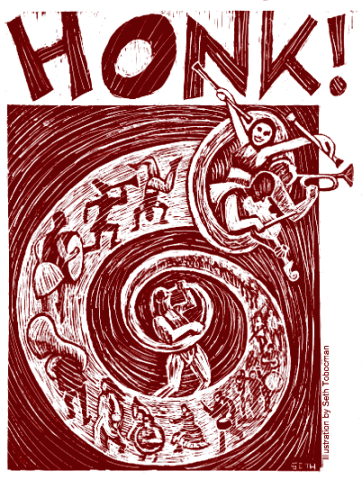
Honk! Bands March to the Beat of Their Own Drums
BOSTON/Davis Square - Kevin Leppmann and his associate Reebee Garofalo have an agenda for Honk! Festival and they aren't afraid to admit it: Get musicians off the stage and into the crowd, and make sure they bring the music with them.
Leppmann (trombone) and Garofalo (snare drum) are members of The Second Line Social Aid and Pleasure Society Brass Band, which founded the Honk! music festival two years ago. Together, and with the help of a small army of volunteers, interns and many community sponsors, they will attract 250 musicians in dozens of brass bands to Davis Square this October 10-12 in a spectacle that blurs the line between performer and audience and eliminates the distinction between "right" and "wrong" notes.
The Second Line Social Aid and Pleasure Society Brass Band's name itself suggests Honk!'s intentions. In the New Orleans tradition of community bands who march for social organizations, the first line comprises essential members of the band and organization, while the second line usually includes music lovers and would-be audience members. Such marches are a hub for social gathering, and Leppmann sees the music as a direct manifestation of the dynamic, ephemeral social forces present at a march. Although you can see video of Honk! on the festival's site, and listen to audio of its various bands online, even the richest medium fails to capture the "clashing interests between band members who struggle to present a shared vision while expressing their own individuality." To fully experience Honk!, you have to be a part of the moment, and if you are, you'll be a part of the music.
This is where the connection between Honk! Festival's music and grassroots social movements becomes apparent. Leppmann and Garofalo understand music as a naturally and traditionally social institution that is inherently inclusive, rather than as the product of an elite, professional group of individuals, made for consumption by an audience. Likewise, grassroots social movements absolutely require participation by the very people who support and will benefit from the movement; grassroots movements find their identity and their power in the many voices of their participants.
Honk!'s site describes the festival as "a spectacle that is radical and subversive without being militant or sanctimonious." Leppmann and Garofalo are bringing this subversive, amateur perspective of music into the Somerville public schools. Public school music programs typically pick several pieces of classical or band music each semester that orchestras and bands rehearse and try to perfect over the course of months. Garofalo believes such regimented, rehearsed production of music "pushes aside the natural musician in all of us," so their course focuses on the expressive, social nature of music rather than "correct notes." Last year, one two-hour workshop was enough time to teach students how to march and perform at Honk!'s opening ceremony the following day. Watch out, Bach.
Honk! Festival relies heavily on monetary and in-kind donations from local business and individuals, and the volunteer efforts of participants. Housing and feeding 250 musicians is no easy task, and organizing a festival, the goal of which is to create a spontaneous, social musical experience, may seem impossible. Fully understanding this, Leppmann hopes to "provide enough structure so things don't fall apart, but not so much that they do fall apart," and Garofalo admits with a smile that "a time comes a few days before Honk! when organizers must say 'whatever happens, happens.' If we don't have control of this event, something great will happen." If you'd like to help Honk! Festival lose control of the event, visit their help page or email volunteer(AT)honkfest(DOT)org. Additionally, Honk! is looking for a summer intern to handle public relations and marketing. The best thing you can do to help, however, is attend and be a part of the music.

